
Secrets of the Thames
Biscuit flavour: sea salt and brown butter
All biscuits decorated by hand using royal icing food colouring gels, edible lustres, and vodka.
You can find out more about the Secrets of the Thames exhibition here: www.londonmuseum.org.uk/whats-on/sec...
09.02.2026 14:15 — 👍 37 🔁 4 💬 0 📌 0

A small angular biscuit in a terracotta colour with raised lines roughly in the shape of two intwined figures. The surface of the biscuit is scratched and chipped to make it look like an ancient piece of pottery.
Finally, here’s a tiny sherd of Roman Samian pottery that seems to depict a somewhat X-rated scene:
09.02.2026 14:15 — 👍 30 🔁 0 💬 1 📌 0

A large biscuits with jagged edges, decorated in blue and white to look like a broken piece of a delftware dish. The design features the shape of a small bird surrounded by swirling lines.
A big old sherd of 17th-century delftware:
09.02.2026 14:15 — 👍 20 🔁 0 💬 2 📌 0

A tiny circular biscuit made to look like an aged metal button, edged with decorative white and turquoise dots.
This tiny treat replicates a gorgeous post-medieval button.
09.02.2026 14:15 — 👍 18 🔁 0 💬 1 📌 0

A close-up photograph of a hand holding an oval biscuit that looks like the seal of a glass bottle. The icing is a rich, dark green colour and the design features a raised characterful face at its centre, framed by dots, dashes, and lines arranged in two concentric circles.
I can’t resist the stern face of this guy, who stars on a green glass bottle seal dating from c.1700-1900.
09.02.2026 14:15 — 👍 19 🔁 0 💬 1 📌 0

A thumb and index finger hold a small biscuit that looks like a knapped flint arrowhead. The biscuit surface has a multifaceted texture in shades of grey and brown, and the light catches the uneven surface of the icing.
Here are some of my favourite biscuified finds in more detail.
First, this Early Bronze Age flint arrowhead (knapped from royal icing):
09.02.2026 14:15 — 👍 24 🔁 3 💬 1 📌 0

Laid out against a dark grey background are ten biscuits that resemble aged, chipped mudlarking finds. An oval biscuit in a rich, dark green looks like the seal of a glass bottle, and features a raised characterful face at its centre. Next to it is an unevenly shaped black biscuit with grey chips and the raised shape of a hare’s face, ears, and upper legs. There are two large biscuits with jagged edges, each decorated in blue and white to look like broken pieces of delftware plates. One features the shape of a small bird surrounded by swirling lines, the other has a series of concentric circles and curved shapes. A small biscuit with a multifaceted texture replicates a knapped flint arrowhead. Next to it are a tiny hammer-shaped biscuit in pewter with delicate cross markings, and a very small gold biscuit button etched with lines, circles, and a rough star shape. The smallest biscuit is made to look like a yellow glass cufflink with decorative circles in blue, white, and red. Another small biscuit has the appearance of an aged metal button edged with decorative white and turquoise dots. Finally, there is a small angular biscuit in a terracotta colour with raised lines roughly in the shape of two intwined figures.
Some mudlarking finds survived for centuries in the muddy banks of the River Thames. Others are freshly baked tasty snacks. 🍪
This biscuit (cookie) set recreates ten of the 350+ mudlarked objects in London Museum's Secrets of the Thames exhibition.
The exhibition closes on 1 March. Don’t miss it!
09.02.2026 14:15 — 👍 157 🔁 55 💬 3 📌 4
The designs biscuified above can all be found in the William De Morgan Tile Library at Wightwick Manor (@nationaltrust.org.uk & @demorganfoundation.bsky.social).
Biscuit flavour: orange, cardamom & vanilla.
All biscuits painted, piped, and glazed by hand.
15.08.2025 08:16 — 👍 77 🔁 2 💬 2 📌 0

Nine square biscuits arranged into a square to look like a panel of old tiles. The biscuit set features an array of designs in shades of blue, green, red, and cream. On the top row, there are: a striking blue deer with purple-red spots; a symmetrical leafy design with a vivid blue flower at the centre; and a glazed relief of a lion and a lioness facing in opposite directions against a patchy rust-red background. The middle row includes: a stylised green line drawing of a galleon ship on choppy waters; two flowers on a rich blue background; and a design densely filled with small green leaves and pomegranates. The bottom row features: a monochrome design with small red leaves and flowers; a symmetrical design with spirals, leaves, and flower shapes in shades of blue; and a glazed biscuit with a Tudor rose and leaves in spruce green against a rich blue background.
William De Morgan was the Arts & Crafts movement’s most brilliant and prolific ceramic artist.
This biscuit (cookie) set is inspired by some of his many tile designs. 🍪
15.08.2025 08:16 — 👍 1170 🔁 240 💬 23 📌 19
Yes, that's right. It makes the food colouring gel into a paintable consistency and then evaporates. I haven't tried it on rice paper - an interesting thought!
01.06.2025 10:15 — 👍 3 🔁 0 💬 1 📌 0
They're gorgeous! 👏
29.05.2025 18:44 — 👍 3 🔁 0 💬 1 📌 0
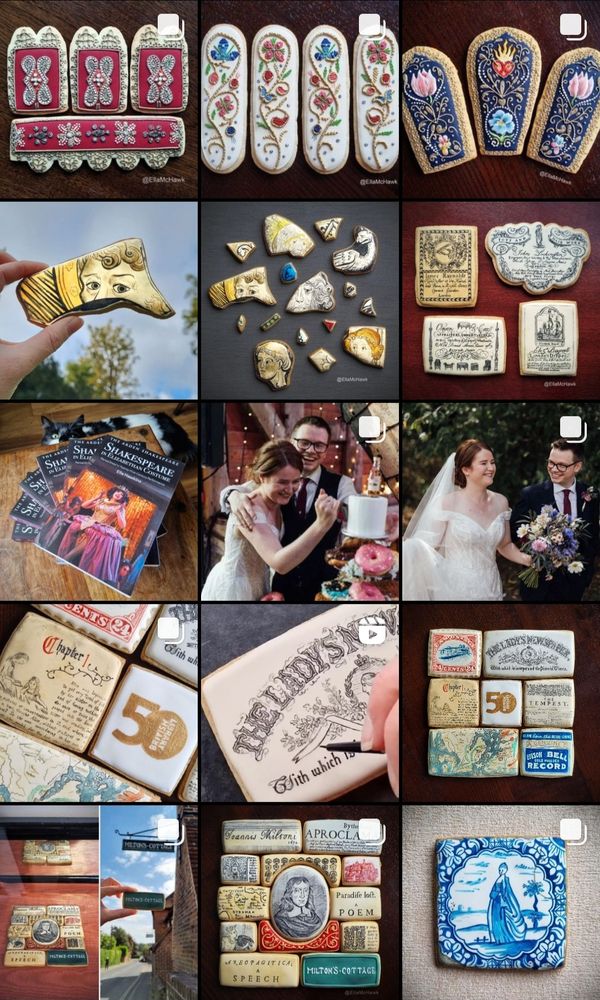
A mosaic of 15 small images of biscuits. Some of the biscuit sets pictured look like Elizabethan embroidery, and one is inspired by 18th-century trade cards. One square shows a close-up image of a biscuit being painted by hand.
I’m currently on maternity leave. Biscuit-making opportunities are proving hard to come by, but I should have a couple of new sets to share soon.
If you’d like to see more in the meantime:
- ellahawkins.com
- Instagram – @ellamchawk
- Facebook – Ella Makes Cakes
Happy National Biscuit Day 2025! 🍪
29.05.2025 07:34 — 👍 722 🔁 63 💬 63 📌 10
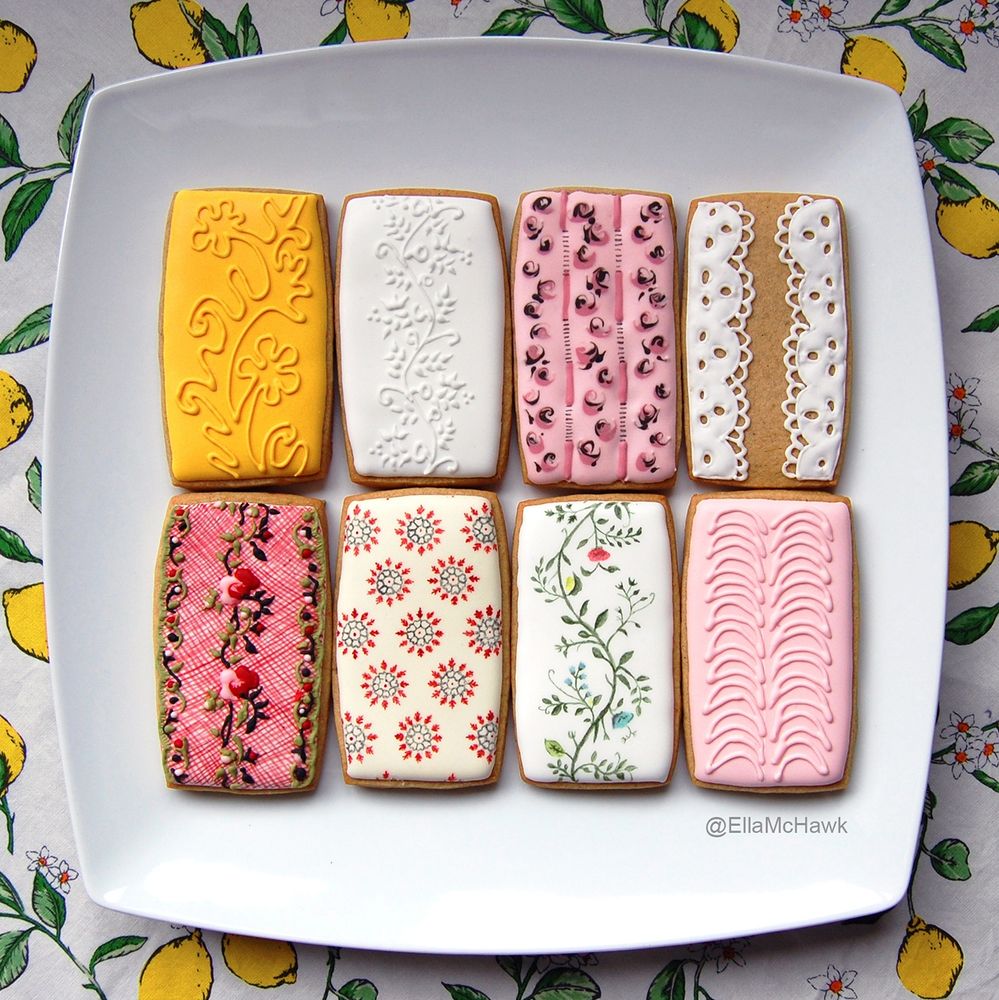
8 rectangular biscuits in shades of pink, white, cream, sunshine yellow, and leaf green. Most biscuits feature floral patterns, either in stylised outline form or as swirling roses. There are some geometric shapes, too – one pattern is made up of circular shapes that look uncannily like COVID-19 under a microscope. Another biscuit is covered in a flouncy eyelet lace design.
I’ll end with some dazzlingly glorious costume design. This summery set pays homage to Alexandra Byrne’s work on the 2020 film adaptation of ‘Emma’.
29.05.2025 07:28 — 👍 1036 🔁 65 💬 16 📌 4
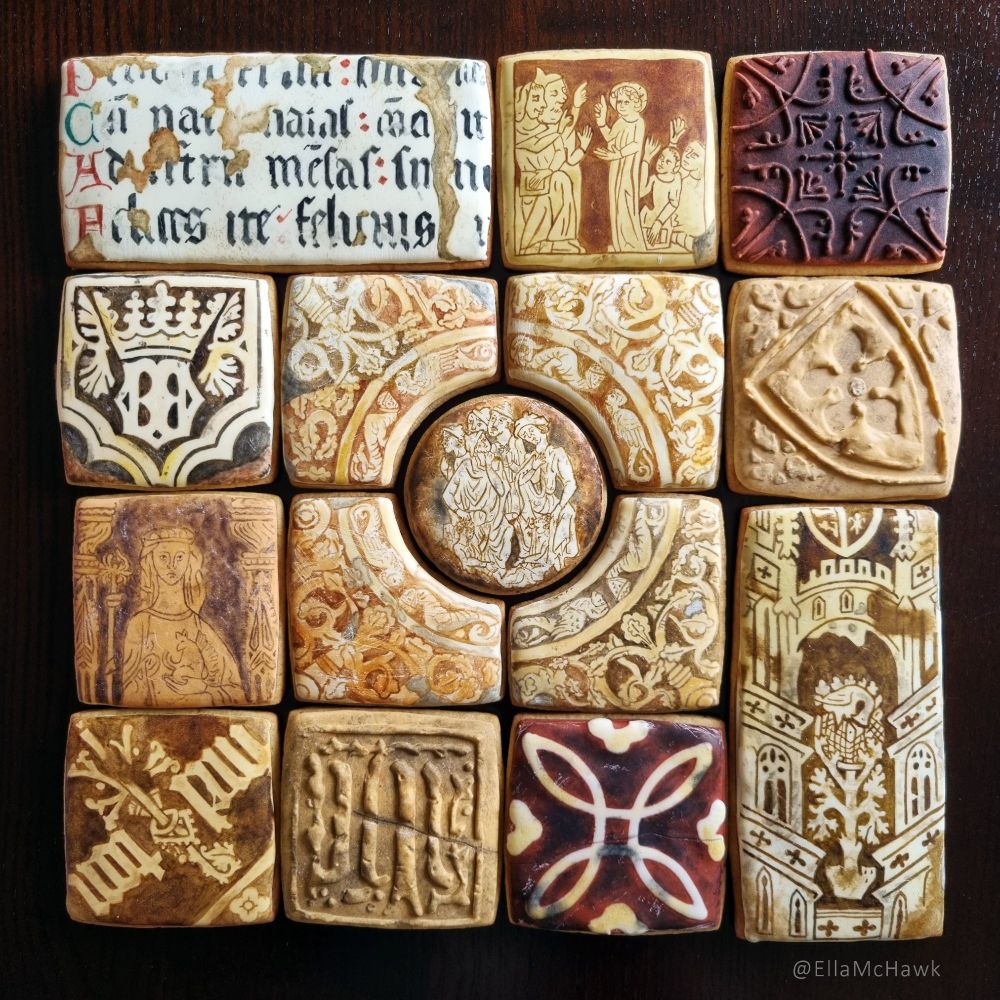
A collection of biscuits painted in shades of brown, yellow, and red. The designs are medieval depictions of people, buildings, text, and symbols. Some designs are 3D, with shields, insignia, or symmetrical patterns raised above the royal icing base. Many of the biscuits look as though they are chipped or cracked. All appear old and dirty.
Almost done! I couldn’t leave out this edible assortment of medieval tiles from the British Museum.
The biscuit recipe was inspired by flavours from the same period: honey, ginger, and clove.
29.05.2025 07:26 — 👍 1856 🔁 255 💬 34 📌 18
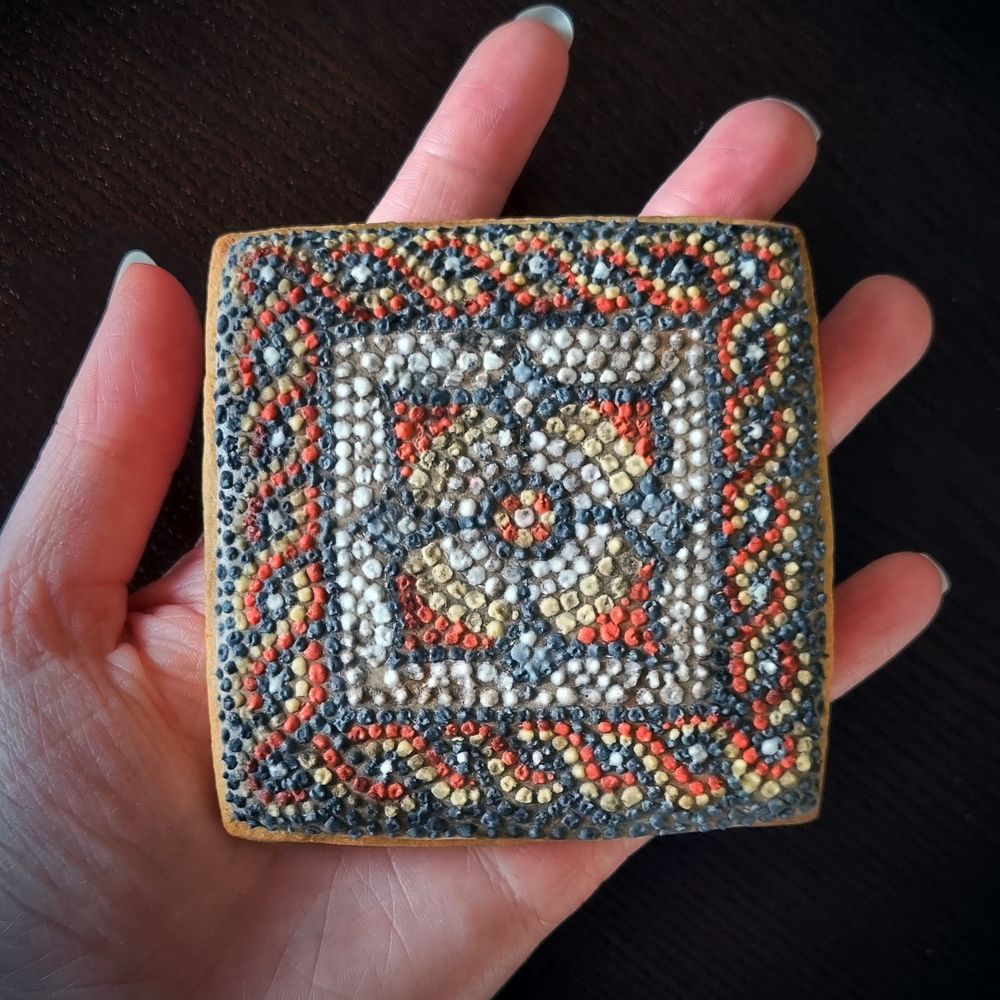
A square biscuit decorated with tiny rough squares of royal icing, creating a mosaic effect. In the centre of the design is a four-leaf flower in shades of red, yellow, and cream. Around the edge of the design is an intertwining strand motif, in shades of red, yellow, and grey. The surface of the biscuit is dirty to create the effect of an excavated mosaic.
Have you ever had the urge to eat a Roman mosaic? This one (the real one, not the biscuit) was found in London by MOLA archaeologists, and dates from the late 2nd to 3rd century CE.
29.05.2025 07:24 — 👍 1257 🔁 105 💬 11 📌 9
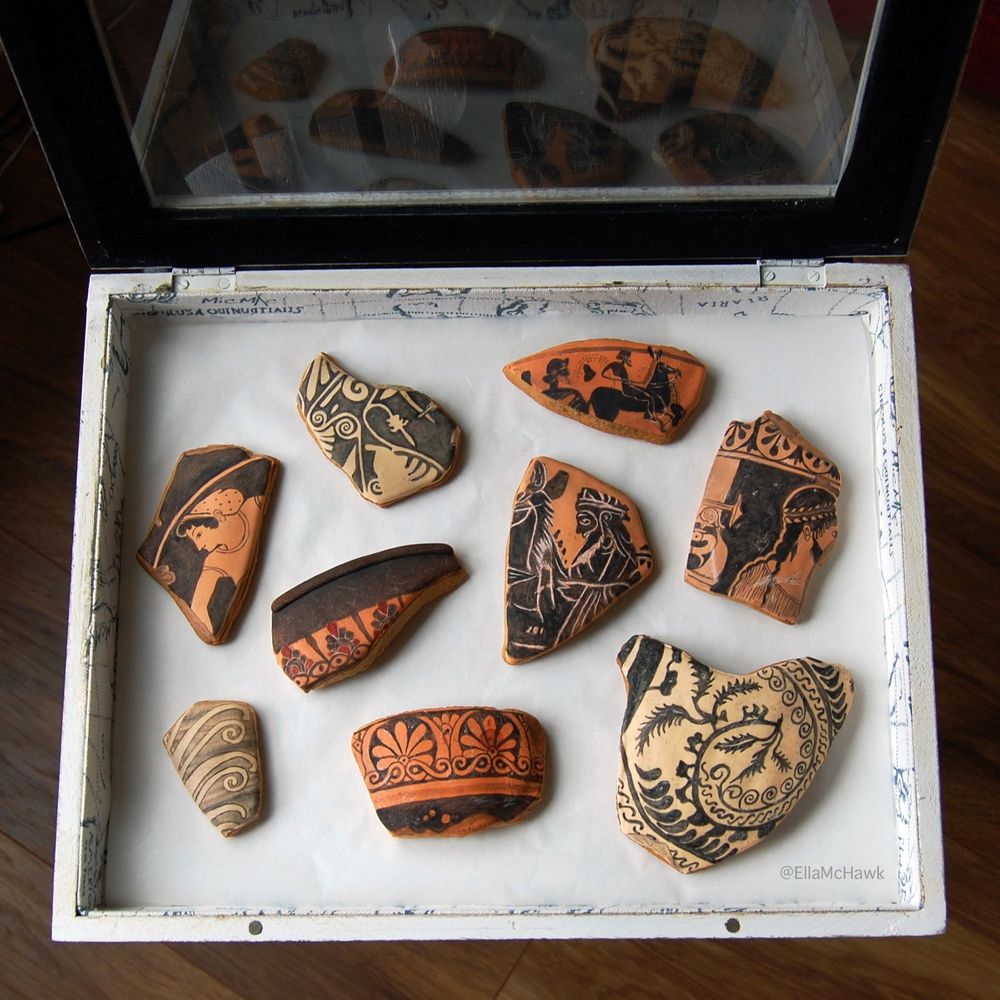
A set of nine unevenly shaped biscuits arranged in a glass-lidded box. Each biscuit is curved and made to look like a fragent of ancient pottery. The base icing is in shades of orange, peach, and cream. Figures, swirls, repeating leaf patterns, and horses are painted onto the icing surface in black. The biscuits are aged with scratch marks and cracks.
Things are about to get a bit ancient.
I baked these biscuity sherds on a hemisphere cake tin in an attempt to recreate Ancient Greek pottery fragments in all three dimensions. The originals, dating from c.1600-435 BCE, can be found in the collections of the Ashmolean Museum.
29.05.2025 07:22 — 👍 1544 🔁 201 💬 21 📌 24
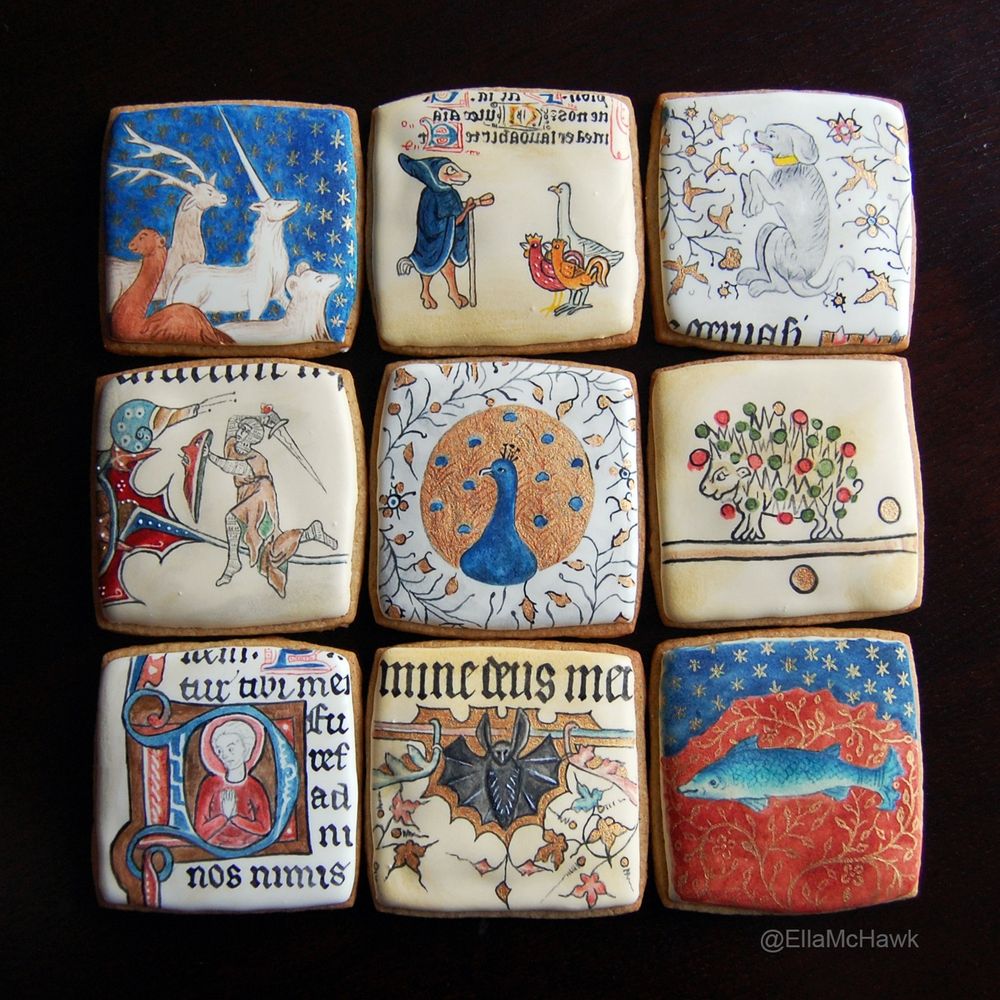
9 square biscuits decorated with illustrations from medieval manuscripts, including Reynard the Fox, a dog, a knight fighting a snail, a peacock, a hedgehog, a bat, and a fish. The set features shades of rich russet red, cobalt blue, gold, brown, turquoise, and green. Some biscuits include small sections of blackletter calligraphy.
One more bookish set for good measure.
These biscuits are inspired by the weird and wonderful world of medieval illustration.
29.05.2025 07:18 — 👍 1653 🔁 235 💬 20 📌 20
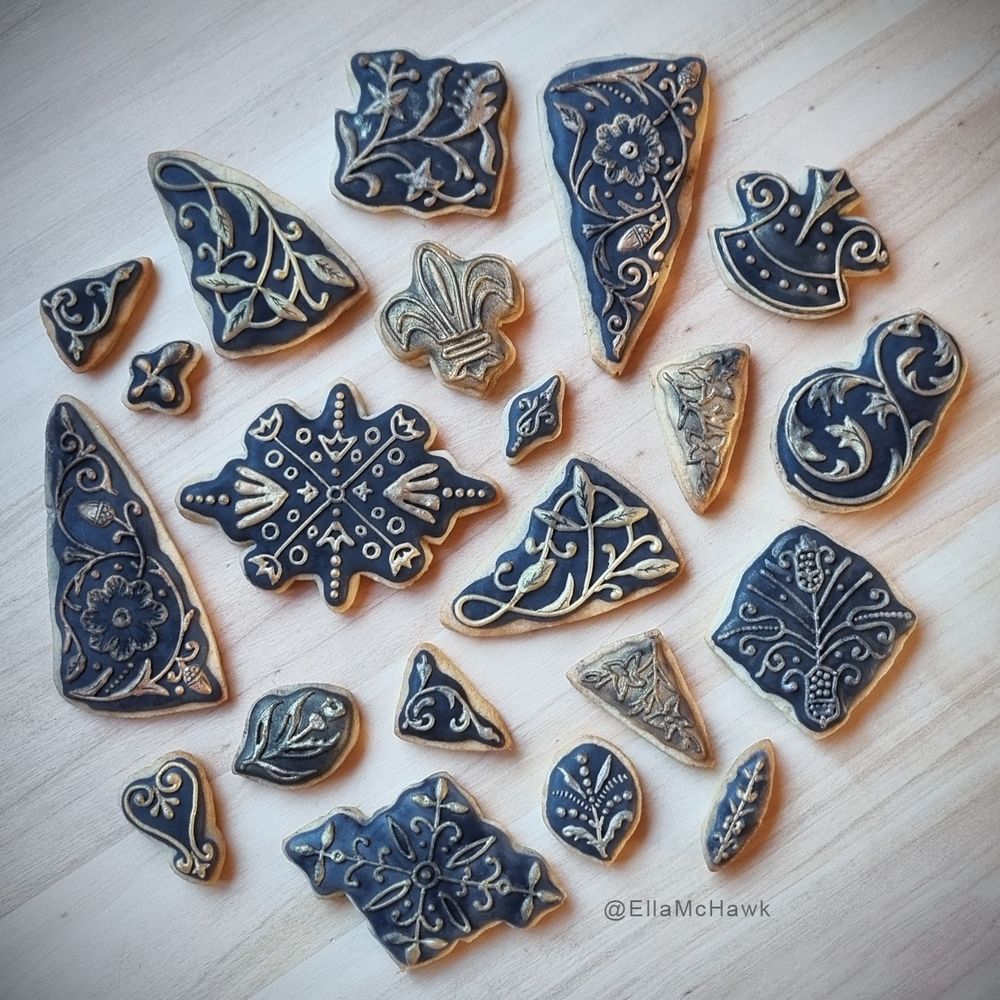
A collection of iced biscuits designed to look like decorative book binding tools. The biscuits are all different shapes and sizes: some are triangular, designed to fit snugly in the corner of a book; others are square, oval, or diamond shaped. Most of the biscuits have a patchy dark background. The designs piped onto the biscuit surfaces feature interweaving curled lines, leaves, spirals, and decorative dots. These raised, 3D designs are painted with metallic lustre dust in different shades of gold, silver, and bronze to make the biscuits look like metal stamps. The biscuits are brushed with dark powder so they appear dirty and aged.
I always wondered how the gold detailing on book bindings gets added.
One day, I happened upon a photo of all the different book binding tools in the University of Reading's Special Collections conservation workshop. Here are some of them in biscuit form.
29.05.2025 07:16 — 👍 1161 🔁 86 💬 2 📌 5
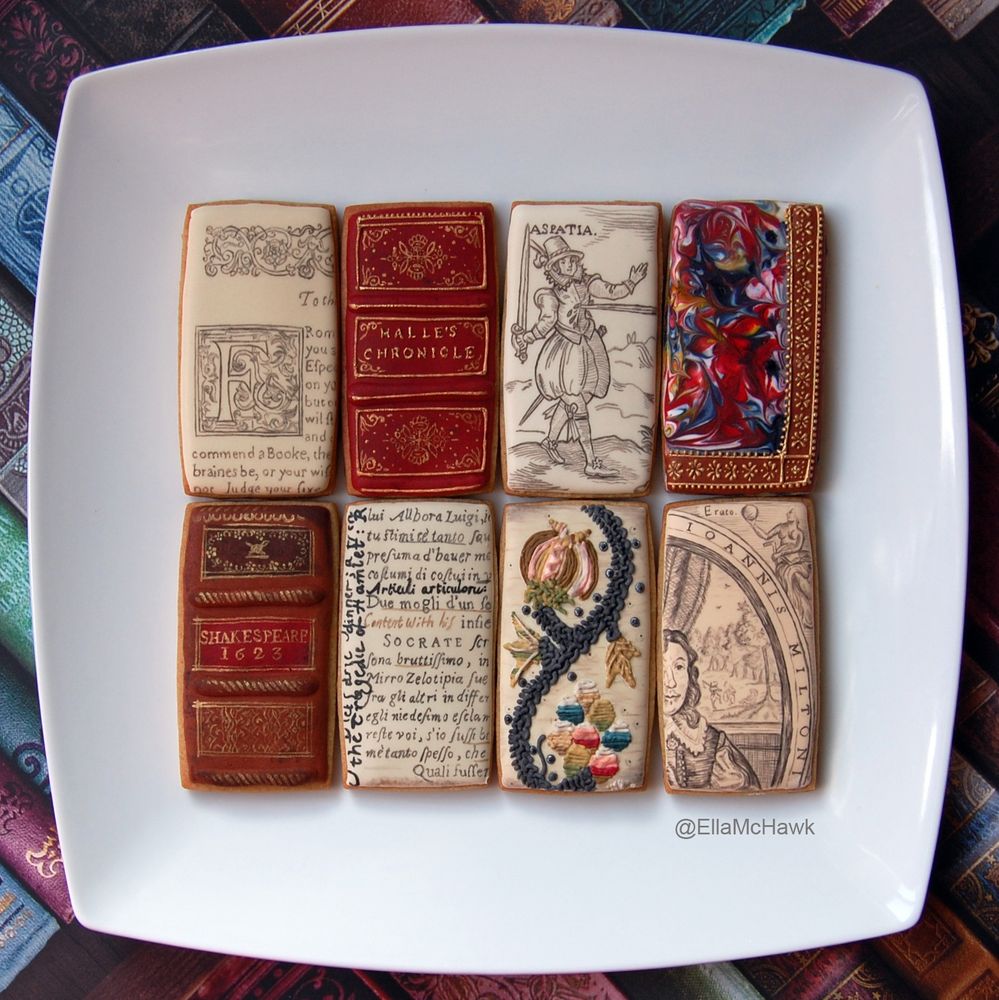
8 rectangular biscuits in shades of cream, red, and brown, laid out on a square white plate against a colourful bookish background. Some biscuits show details of printed pages from early modern books (an illuminated letter, an illustration, handwritten annotations). Others are based on book bindings, featuring gold details and marbling. On the top row, a figure in a feathered hat, doublet, and voluminous hose is being stabbed in the chest by a long sword.
Let’s do a bit of literary history next. This set is inspired by early modern books in the Shakespeare Birthplace Trust and Folger Shakespeare Library collections.
Shakespeare’s First Folio makes three biscuity appearances here. Honourable mentions also to Milton and to Beaumont and Fletcher.
29.05.2025 07:14 — 👍 1300 🔁 117 💬 10 📌 6
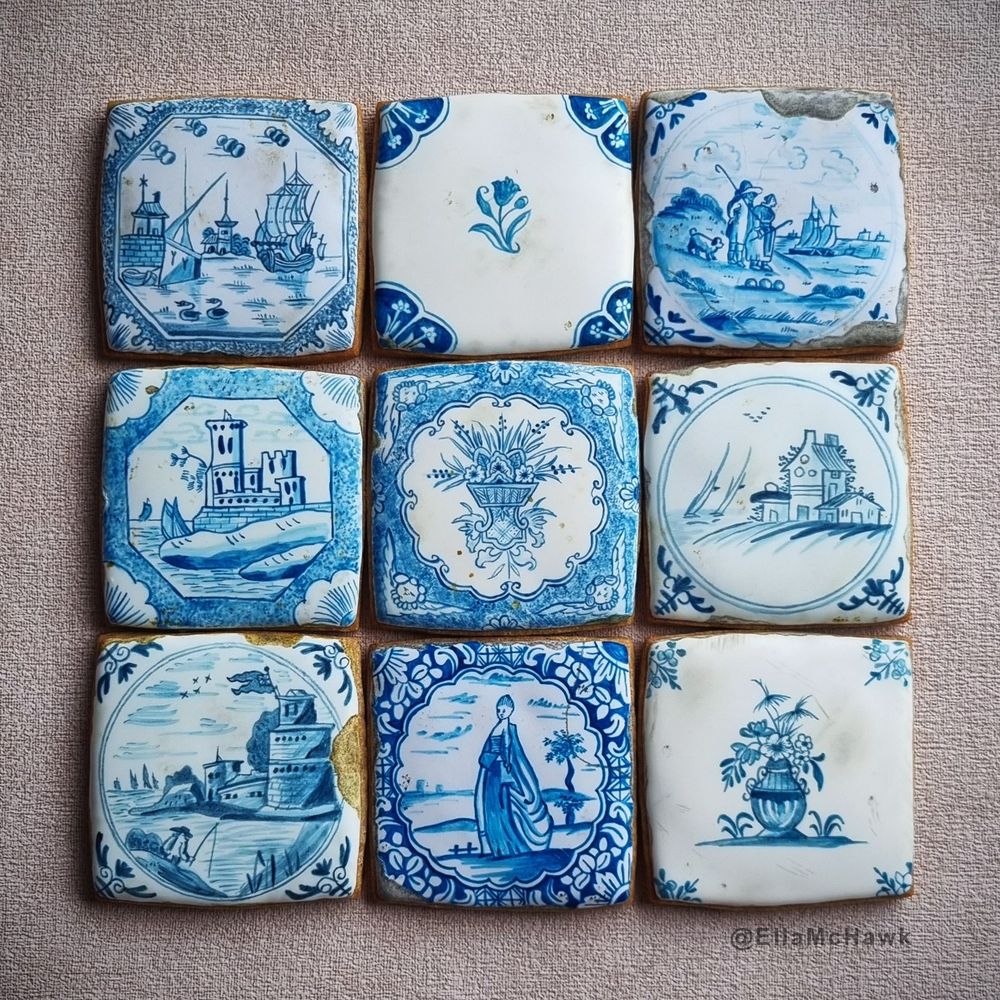
A square arrangement of 9 individual biscuit tiles painted in rich shades of blue and made to look old, chipped, and cracked. On the top row, there is: a ship with billowing sails approaching a dock with two stylized ducks or geese in the foreground; a delicate flower motif in the centre of a bright white tile with deep blue detail at each corner; a cracked tile depicting two figures in rustic historical dress looking out to sea, accompanied by a small dog. The middle row features: a roughly painted castle surrounded by an octagonal frame; an intricate floral arrangement with an angel at each of the tile’s four corners; a cluster of rustic buildings with boat sails and a flock of birds in the distance. Finally, the bottom row of biscuits includes: a figure fishing in the foreground of a multi-storey round tower; a woman wearing a flowing eighteenth-century gown, encircled by a deep blue floral pattern; a small vase of flowers in the centre of an aged white biscuit.
Delftware tiles!
There were hundreds of fabulous examples to choose from in the Victoria & Albert Museum’s online catalogue, but I eventually settled on nine.
These 18th-century ships, shepherds, castles, figures, and flowers brought me joy. I hope they’ll do the same for you, too.
29.05.2025 07:11 — 👍 1668 🔁 189 💬 16 📌 14
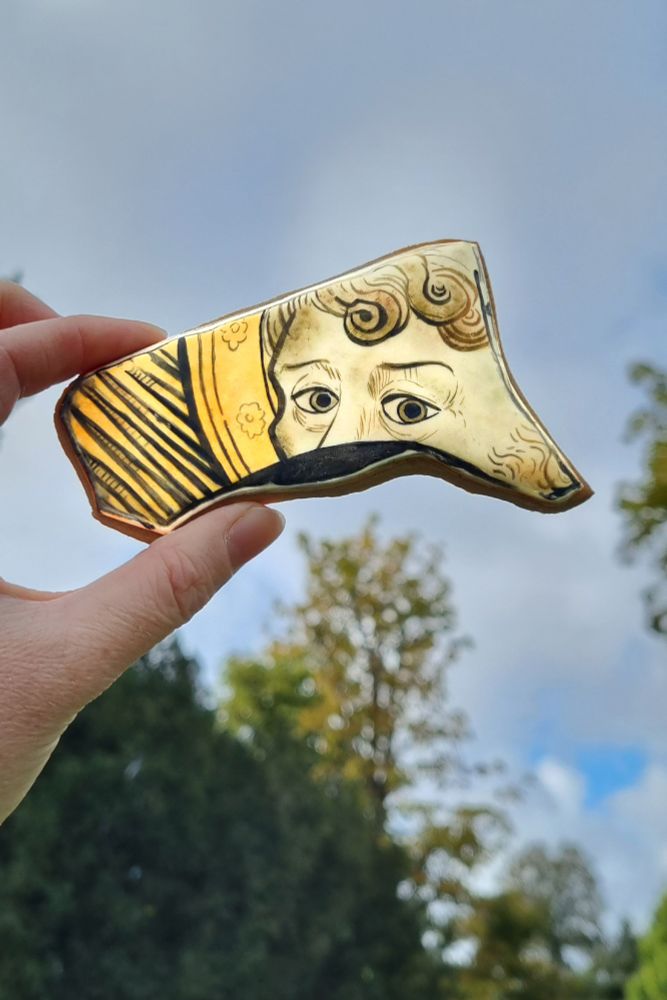
A hand holds up a biscuit with uneven edges against a cloudy sky. The biscuit has an egg-yellow background decorated with strong black lines. A man with curled hair and striking eyes features in the foreground of the design. Only his eyes, eyebrows, and forehead are visible; a jagged break line at the bottom of the biscuit shows where the design would continue.
Most of my biscuits get eaten, but I hung on to this one.
The flavour is orange, cardamom, and vanilla, and the design was painted by hand onto royal icing using food colouring gels and vodka.
29.05.2025 07:09 — 👍 1006 🔁 66 💬 11 📌 3
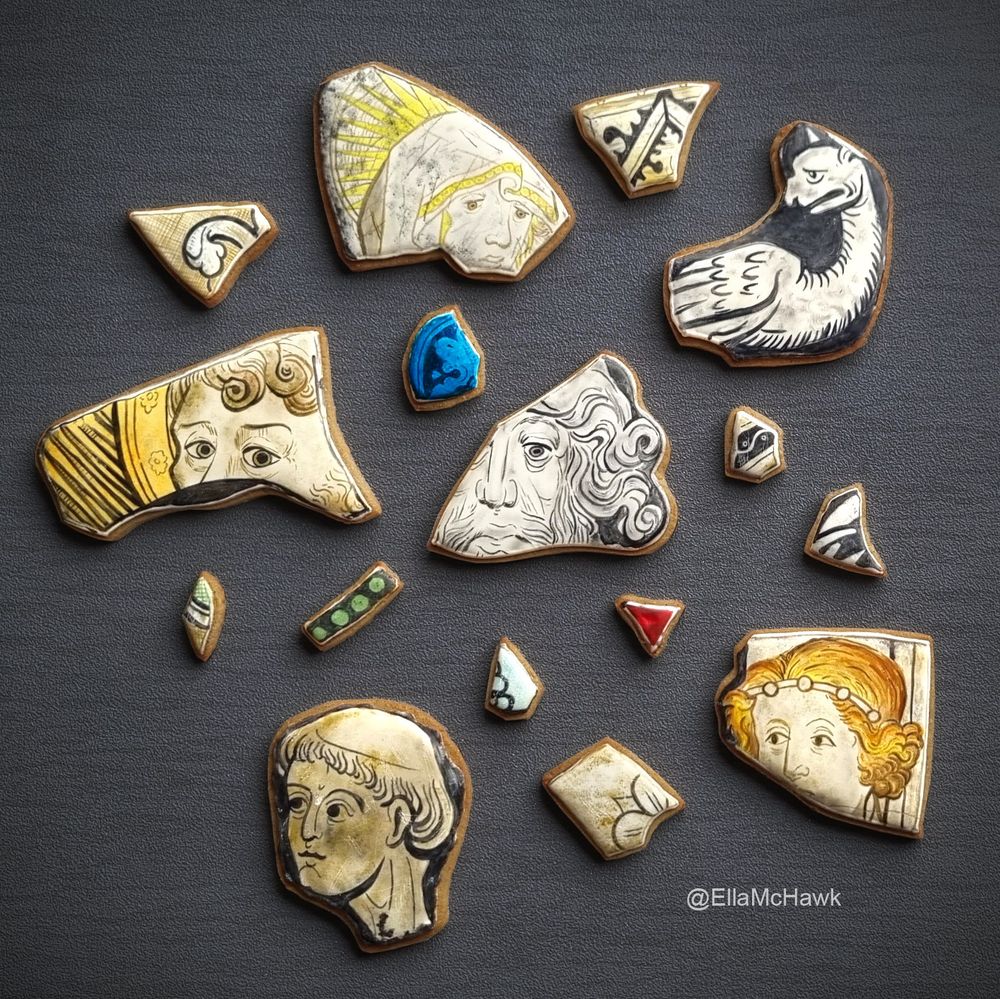
A collection of biscuits made to look like stained glass window fragments. There are six larger biscuits featuring different faces: a woman looking downwards; a griffin-like creature with wings and a long neck; an old man with long facial hair; a woman with golden hair and a simple tiara; a bald man painted in monochrome; a man with curled hair and striking eyes. The larger biscuits are surrounded by a scattering of smaller fragments. There is a jewel-red fragment in a triangular shape, a small green rectangle, and a bright blue semi-circular shard painted with a leaf pattern. Other small biscuits have bold black-and-white patterns made up of lines, circles, and floral shapes. Many of the biscuits are made to look dirty and scratched.
From Arts & Crafts patterns to medieval archaeology.
These biscuits recreate stained glass fragments found a few years ago in the triforium of Westminster Abbey.
29.05.2025 07:06 — 👍 1707 🔁 192 💬 7 📌 20
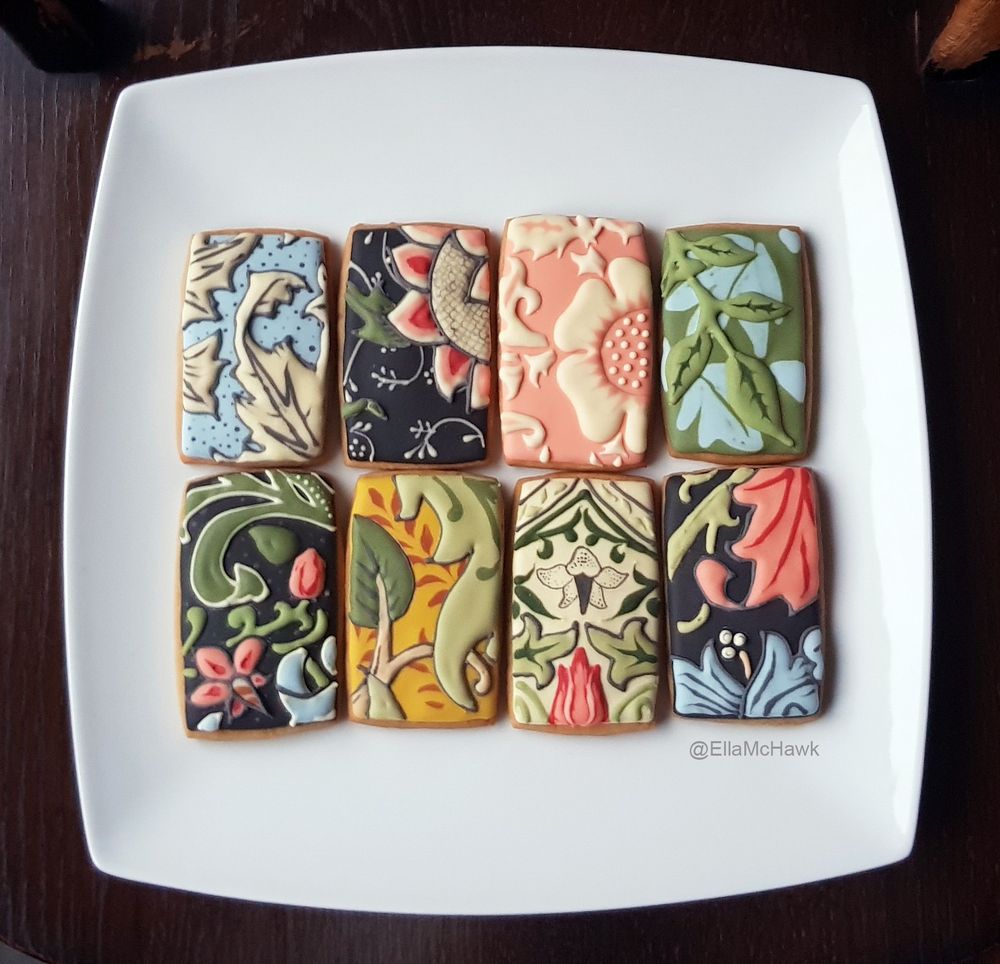
A set of eight rectangular cookies arranged on a square white plate against a dark wooden background. Each cookie is inspired by a wallpaper design by Morris & Co. The patterns represented feature different floral and leaf shapes in shades of baby blue, soft pink, leafy green, mustard yellow, cream, and dark grey.
Today is National Biscuit Day, and it’s about time that I populated this account with biscuit (cookie) sets from the past few years. Here are some of my favourites. 🧵
First up, a set inspired by the delicious designs of William Morris and John Henry Dearle.
29.05.2025 07:04 — 👍 8504 🔁 1898 💬 342 📌 543

A hand holds a tiny biscuit decorated to look like a teacup. A band of green encircles the rim of the white cup, and the words 'With fond love for thee' are painted on its side in tiny writing.
All designs painted onto royal icing by hand using food colouring gels and vodka.
The biscuit (cookie) flavour is based on a Victorian recipe for fig pudding. Ingredients include fig, candied peel, almond & sherry.
20.12.2024 09:22 — 👍 112 🔁 8 💬 3 📌 0
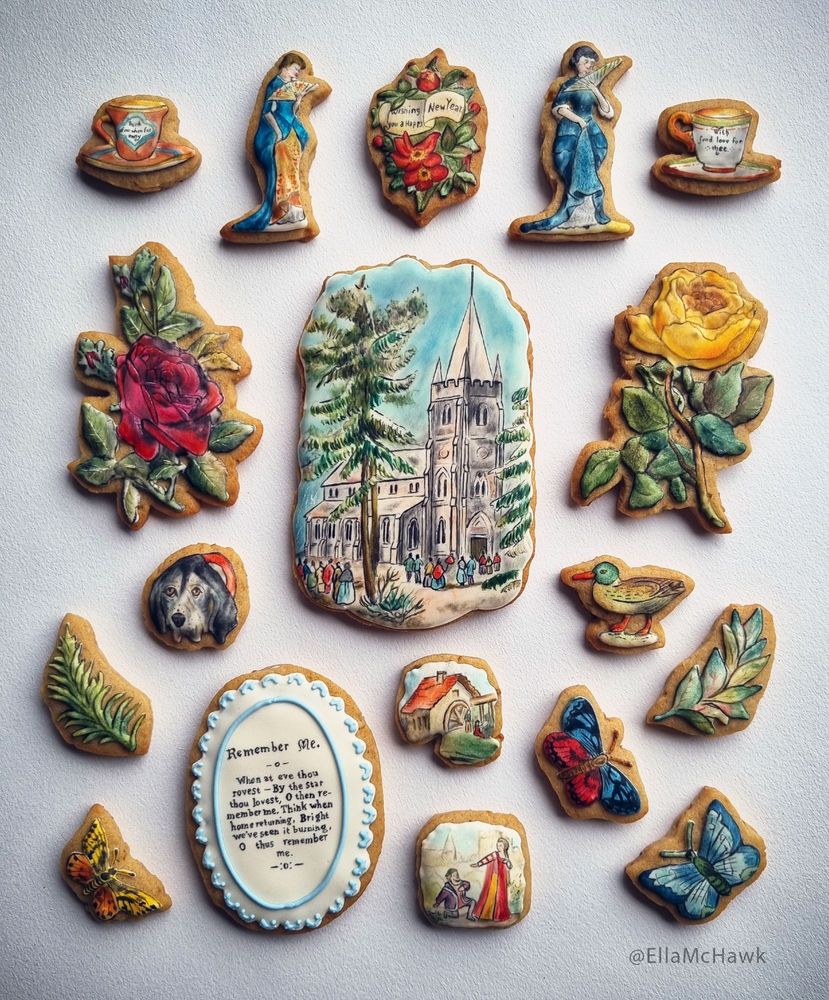
A collection of 18 biscuits of different sizes and shapes. In the centre is a large rectangular biscuit with rounded edges, painted with a snowy church scene. Flanking that biscuit are two large roses in shades of yellow and magenta. At the top corners of the set are two tiny teacups: one features spindly text that reads 'Think of me when far away', and the other says 'With fond love for thee'. The other biscuits in the set include: small butterflies in vivid shades of red, blue, yellow, and orange; leaves; a duck; a Basset hound; tiny figures in historical dress; a water mill scene; a decorative oval with a short verse titled 'Remember me'; and a bouquet adorned with a banner that reads 'Wishing you a Happy New Year'.
’Tis the season for a biscuit set inspired by Victorian scrapbooking. 🍪
These festive scraps come from two scrapbooks in the Powerhouse Collection, both thought to have been compiled by children between 1880 and 1890.
20.12.2024 09:22 — 👍 303 🔁 64 💬 8 📌 6

A hand holds a tiny biscuit decorated to look like a teacup. A band of green encircles the rim of the cup, and the words 'With fond love for thee' are painted on its side in small writing.
All designs painted onto royal icing by hand using food colouring gels and vodka.
The biscuit (cookie) flavour is based on a Victorian recipe for fig pudding. Ingredients include fig, candied peel, almond & sherry.
20.12.2024 09:13 — 👍 4 🔁 1 💬 0 📌 0
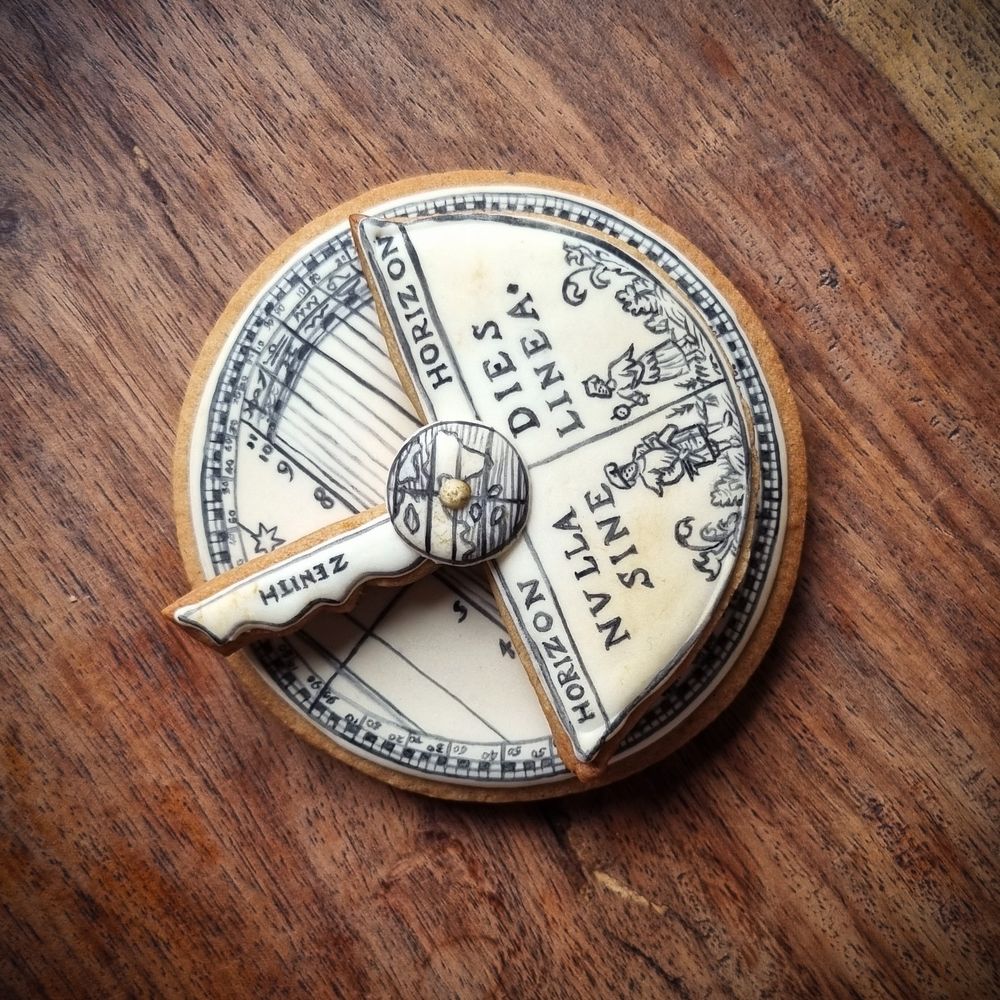
Two biscuits stacked on top of one another, designed to look like a rotating diagram from an early modern astronomical book. The lower biscuit is circular and features a series of horizontal lines and tiny numbers in an early modern font. The top biscuit is roughly in the shape of boat: the 'mast' area reads 'zenith'; the main body of the shape features tiny figures in historical dress holding astronomical instruments and a Latin motto reading 'Nulla dies sine linea'. In this image, the top biscuit is rotated anticlockwise by around 100 degrees.
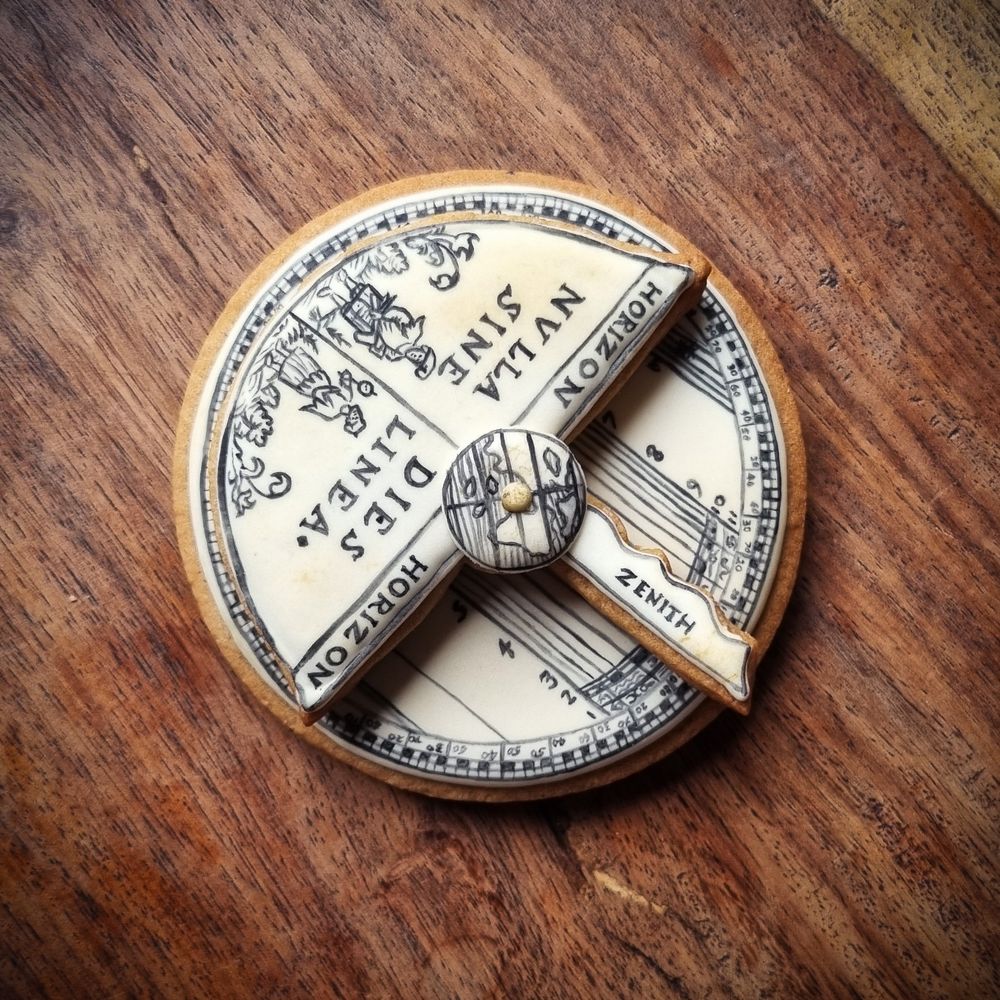
Two biscuits stacked on top of one another, designed to look like a rotating diagram from an early modern astronomical book. The lower biscuit is circular and features a series of horizontal lines and tiny numbers in an early modern font. The top biscuit is roughly in the shape of boat: the 'mast' area reads 'zenith'; the main body of the shape features tiny figures in historical dress holding astronomical instruments and a Latin motto reading 'Nulla dies sine linea'. In this image, the top biscuit is rotated clockwise by around 100 degrees.
Biscuit (cookie) flavour: Orange, cardamom & vanilla.
The design is painted onto royal icing by hand using food colouring gels and vodka.
This biscuit was created using the wonderful Special Collections & Archives at Utah State University.
05.12.2024 09:04 — 👍 171 🔁 23 💬 11 📌 3
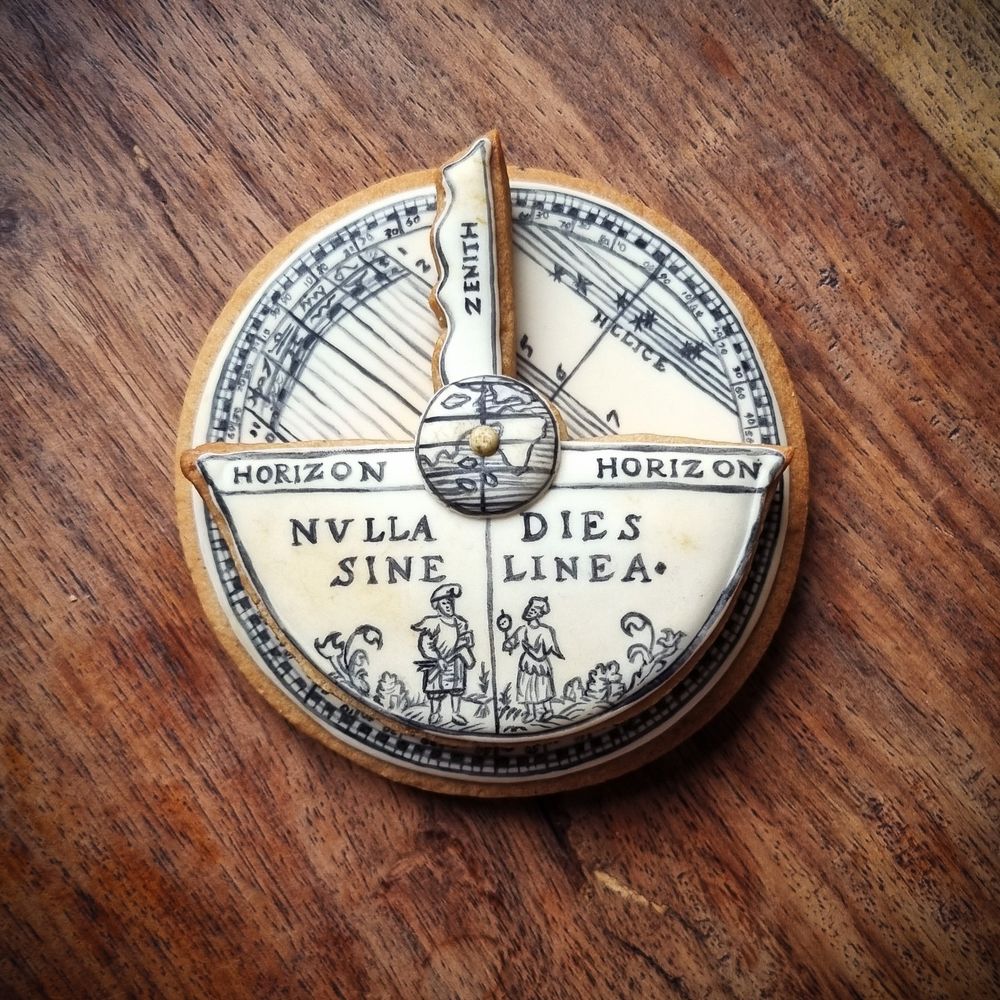
Two biscuits stacked on top of one another, designed to look like a rotating diagram from an early modern astronomical book. The lower biscuit is circular and features a series of horizontal lines and tiny numbers in an early modern font. The top biscuit is roughly in the shape of boat: the 'mast' area reads 'zenith'; the main body of the shape features tiny figures in historical dress holding astronomical instruments and a Latin motto reading 'Nulla dies sine linea'.
Centuries ago, many astronomical books included moving parts to help readers interpret the world around them.
This biscuit recreates a diagram from Sacrobosco’s ‘De Sphaera’ (c.1550). It could be used to calculate the changing length of daylight hours through the year. 🍪
05.12.2024 09:04 — 👍 1210 🔁 313 💬 35 📌 59
Research Associate in Natural History Humanities at the Sedgwick Museum of Earth Sciences, University of Cambridge (https://www.esc.cam.ac.uk/staff/dr-richard-fallon). Author of "Contesting Earth's History", "Reimagining Dinosaurs", and more.
Prof of Shakespeare and early modern lit, Research Director at Oxford Brookes. ‘Lifelike Shakespeare’ coming soon from OUP. 🏴
Senior Lecturer in Shakespeare and Early Modern Literature at Brunel University of London
Lecturer in Early Modern Drama | Leverhulme ECF | University of Leeds (views my own)
Shakespeare • duty and service • exile and imperialism • English Renaissance drama (1575-1625) • law and literature
Sunday Times bestselling author: how nature & craft improve #mentalhealth |
BBC Springwatch | Etsy (silverpebble)| Creative & mental health workshops #AuDHD 🏳️🌈| Agent: Juliet Pickering
The University of Birmingham's dedicated Shakespeare research centre in Stratford-upon-Avon
Simply the best place in the world to study Shakespeare.
https://t.co/65CgPIMCOm
Shakespeare, performance, then and now. Music, media now and then.
supporting researchers counting words in various ways with computers at university of arizona libraries; increasingly displaced new englander
Lecturer at Royal Holloway, University of London | researching the materials of Nationalism in C17th civic performance | she/her
English prof in the prairies | Shakespeare | Austen | Food | Cults and Coercive control | Pedagogy | Unions | Anti-Fascist | Anti-Genocide
NYT Bestselling Author. Medical Historian. Breast Cancer Survivor.
Next book: SLEUTH-HOUND, a whirlwind tour of Victorian forensics from the perspective of the man who loaned a voice & razor-sharp logic to Baker St.’s famous resident: Sherlock Holmes.
Historian, writer, broadcaster. She/her. Latest book, FALLEN IDOLS, shortlisted for the Wolfson History Prize 2022. HISTORY’S SECRET HEROES and THE LUCAN OBSESSION on BBC Radio 4. One of the Silk Road Slippers https://www.silkroadslippers.com
That one medieval historian you've heard of. Co-host We're Not So Different and Gone Medieval podcasts. Author of The Once and Future Sex. (Out now!) George Michael stan. Cutie.
https://eleanorjanega.com/
Not even the most famous person in my bedroom. Full biog: https://tinyurl.com/29skn3p6
Historian of religion and belief | folklorist | Balticist | indexer | lay canon @stedscath.bsky.social | series editor for @universitypress.cambridge.org
Oxford historian, best-selling writer fiction & non-fiction, documentary maker, cat lover, vegetable grower, unrelenting optimist. Gotta lotta love to share.
Terrible news, chums... Gleeful Beast, head writer on Netflix's Bad Dinosaurs. Jokemonger for shows you hate. Maker of historical podcasts. Chief Sparkle Enthusiast at Sparklegoose! He-flapper.
Sort of retired (not), Professor Emerita, The Open University. Classics, history of medicine/the body/gynaecology. Writer, blogger, C of E lay preacher, chair of Together on General Synod (formerly Gender & Sexuality Group). She/her. Likes flowers.

























